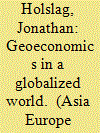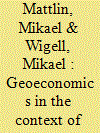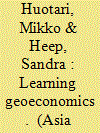|
|
|
Sort Order |
|
|
|
Items / Page
|
|
|
|
|
|
|
| Srl | Item |
| 1 |
ID:
145423


|
|
|
|
|
| Summary/Abstract |
This article argues that geoeconomics, defined as the geostrategic use of economic power, has become an increasingly important feature of regional powers’ strategic behavior. Yet, we still lack analytical tools to identify and compare regional powers’ geoeconomic strategies. The article marks a first attempt to develop a typology for differentiating potential geoeconomic strategies that regional powers may pursue in dealing with their corresponding regions. It merges the regional power focus with a geoeconomic perspective, producing the following four ideal-typical strategies: neo-imperialism, neo-mercantilism, hegemony, and liberal institutionalism.
|
|
|
|
|
|
|
|
|
|
|
|
|
|
|
|
| 2 |
ID:
145426


|
|
|
|
|
| Summary/Abstract |
The Chinese party-state and Chinese companies have become increasingly active in Sub-Saharan Africa, especially in the natural resource sector. Accessing natural resources is assumed to be one of the main goals of both the Chinese government and relevant Chinese companies in resource-rich African countries. In the article, the interplay between Chinese party-state and state-owned enterprises in Zimbabwe is analyzed from the viewpoint of China’s geoeconomic strategy. While existing literature has focused on various facets of China’s Africa policy, details of collaboration between Chinese party-state and corporate actors remain largely unexamined. In the natural resource sector, such collaboration ranges from negotiating access to natural resources to arranging large Chinese-financed projects repaid or collateralized in natural resources. The article analyzes in detail the cases of three companies that have been involved in such arrangements in Zimbabwe’s natural resource sector between 2000 and 2013: NORINCO, AFECC, and CMEC. The central argument advanced in the article is that China’s Ministry of Commerce, Eximbank and CDB have pressured the Zimbabwean government to offer resources as collateral for further Chinese loans, in particular in the mid-2000's. The article concludes that while a geoeconomic strategy seems to be in place, its implementation is hindered by the great variety of actors involved.
|
|
|
|
|
|
|
|
|
|
|
|
|
|
|
|
| 3 |
ID:
145425


|
|
|
|
|
| Summary/Abstract |
This paper explains why and how China seeks to continue to promote export-driven industrialization. This way, it comes as a corrective to the widespread assumption that the Chinese government is readying to rebalance its growth from investment and export to more domestic consumption. But the paper also presents an important case of a largely geoeconomics strategy. What explains China’s quest for industry, it finds, is a quest for economic security, economic competitiveness, and more economic independence from large foreign suppliers of capital, brands, and knowhow. What characterizes the consequent policy, the paper goes on, is an increasingly more sophisticated push for exports. China’s aim in that regard is not to undermine the relatively open global market, but to bend the trade flows into its advantage by means of export credit, tax rebates, and so forth.
|
|
|
|
|
|
|
|
|
|
|
|
|
|
|
|
| 4 |
ID:
145422


|
|
|
|
|
| Summary/Abstract |
Geoeconomic power and its use appear to be a crucial, albeit understudied aspect of today’s international relations. Traditionally, international power has been thought of in geopolitical rather than geoeconomic terms. Indeed, ever since the famous debate about sea power and land power between Alfred Thayer Mahan and Halford MacKinder at the cusp of the twentieth century, scholars have linked geography with the pursuit of political and military power.
|
|
|
|
|
|
|
|
|
|
|
|
|
|
|
|
| 5 |
ID:
145424


|
|
|
|
|
| Summary/Abstract |
China’s rise is increasingly impacting on the global financial and monetary order. To manage its growing centrality in global financial flows and its new relevance for patterns of currency usage, Beijing has been creating a set of new institutional arrangements in three crucial fields: the provision of crisis liquidity, development financing, and a global infrastructure to internationalize its currency. In contrast to the dominant power political interpretation of such developments, this article highlights the strong linkages of Beijing’s new initiatives with the changes in China’s capitalist development path and stresses their experimental character that serves to manage the economic and political risks of China’s accelerating financial internationalization.
|
|
|
|
|
|
|
|
|
|
|
|
|
|
|
|
| 6 |
ID:
145427


|
|
|
|
|
| Summary/Abstract |
Due to global climate change, the Arctic is losing its ice cover with two expected economic consequences: new accessible natural resource reserves and opening maritime routes are anticipated to become accessible. As a result, the Arctic is expected to transform into a globally important geoeconomic space. The article approaches the geoeconomic Arctic by asking whether this transformation is plausible and forthcoming. In particular, the article analyzes critically practical challenges for Arctic economic development as well as geopolitical challenges to the region as a favourable investment and operating environment. The article concludes that while the Arctic will develop economically, the pace and scope of developments are likely to remain moderate due to complex challenges, and that the geoeconomic importance of the region may be exaggerated. Furthermore, external geopolitical dynamics can hinder the realization of the geoeconomic potential of the Arctic. Due to various spill-over effects, illustrated by the crisis in Ukraine, the Arctic is not necessarily as stable an investment and operating environment as often assumed.
|
|
|
|
|
|
|
|
|
|
|
|
|
|
|
|
| 7 |
ID:
145428


|
|
|
|
|
| Summary/Abstract |
In this article, we examine Russia’s geo-economy under the economic sanctions imposed by the EU, the USA and many other states since spring 2014, including restrictions on economic cooperation in areas such as trade, certain types of energy technology, access to credit, trade in arms, travel bans and asset freezing. We first examine Russia’s economic and geopolitical interests and the cognitive frames Russian policymakers use to weigh these diverse interests against each other. Second, we examine how Russian policymakers can further these interests given the effect of the sanctions on Russia’s geo-economy. We analyse constraints and opportunities along the resource geographic, financial and institutional dimensions of geo-economy. Regarding resources, the sanctions seriously hamper new greenfield projects in Russia’s emerging energy provinces. They impede the industry’s middle- to long-term prospects while some Russians perceive new opportunities for its domestically induced modernisation. Along the financial dimension, low oil prices since mid-2014 shape existing fossil fuels trade more than the sanctions, which have no impact on Russia’s arms exports. The combined effect of low oil prices and sanctions on Russia’s state budget, the financial sector and the rouble is severe. On the institutional dimension, Russia’s international standing suffers, but its domestic institutions are relatively resilient. Overall, we see Russia as part of an international structure where it can constitute itself as an autonomous geo-economic actor under favourable conditions including high oil prices and no sanctions.
|
|
|
|
|
|
|
|
|
|
|
|
|
|
|
|
|
|
|
|
|